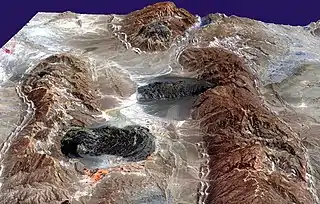Hormuz Formation
The Hormuz Formation, Hormuz Series, Hormuz Evaporites or Hormuz Group is a sequence of evaporites that were deposited during the Ediacaran (Late Neoproterozoic) to Early Cambrian, a period previously referred to as the Infra-Cambrian. Most exposures of this sequence are in the form of emergent salt diapirs within anticlines of the Zagros fold and thrust belt. As a result of their involvement in post-depositional salt tectonics, the internal stratigraphy of the sequence is relatively poorly understood. They are the lateral equivalent of the evaporite-bearing Ara Group in the South Oman Basin.[1]

Distribution
The Hormuz Formation is known from a wide area of the Zagros Mountains and around and beneath the Persian Gulf. Two main depositional basins have been recognised, the North Gulf and South Gulf Basins, separated by the Qatar Arch. The basins were formed as a result of extensional tectonics towards the end of the Pan-African Orogeny. The main structure formed during this period were NW-SE trending dextral (right lateral) strike-slip faults and NE-SW trending extensional faults.
Stratigraphy
Most occurrences of the Hormuz Formation are highly disturbed tectonically. However, a broad stratigraphy has been recognised.[2]
Effect on Zagros structure
Halite layers within the Hormuz sequence form the most important decollement level within the Zagros fold and thrust belt. The presence and thickness of the halites has had a major influence on the geometry of the thrust belt and such variations has been used to explain lateral changes in structural style along the belt.[3]
References
- Smith A.G. (2012). "A review of the Ediacaran to Early Cambrian ('Infra-Cambrian') evaporites and associated sediments of the Middle East". In Bhat G.M. (ed.). Geology and Hydrocarbon Potential of Neoproteozoic-Cambrian Basins in Asia. Special Publications. London: Geological Society. pp. 229–250. ISBN 9781862393462.
- Talbot C.J.; Alvi M. (1996). "The past of a future syntaxis across the Zagros". In Alsop G.I.; Blundell D.J.; Davison I. (eds.). Salt Tectonics. Special Publications. Vol. 100. Geological Society. pp. 89–109. ISBN 9781897799444.
- Bahroudi, A.; Koyi H.A. (2003). "Effect of spatial distribution of Hormuz salt on deformation style in the Zagros fold and thrust belt: an analogue modelling approach". Journal of the Geological Society. London: Geological Society. 160 (5): 719–733. doi:10.1144/0016-764902-135. S2CID 131504678.